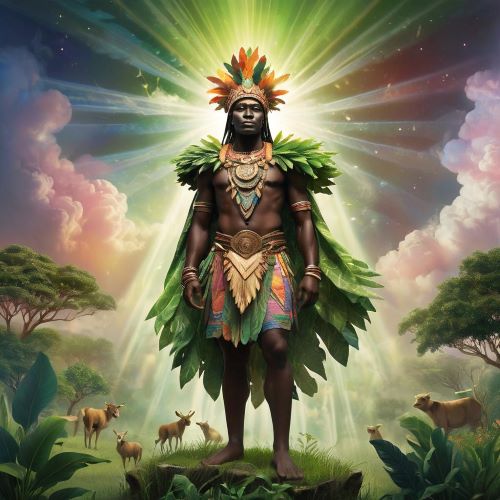Mangbetu Gods
The Mangbetu Gods hold a central place in the spiritual and cultural identity of the Mangbetu people, who are indigenous to Central Africa, particularly in the northeastern region of the Democratic Republic of the Congo. These deities and mythical figures reflect the natural environment, human life, and the cosmos as understood by the Mangbetu. Belief in these gods helped shape Mangbetu society, guiding them through challenges and shaping their daily practices. Rooted in oral tradition, these gods were revered in rituals, ceremonies, and storytelling, passed down from one generation to the next.
One of the prominent aspects of Mangbetu mythology is the connection between the gods and the natural world. The Mangbetu people, living in a region rich with rivers, forests, and wildlife, often envisioned their deities as guardians of these elements. Some gods were thought to control the rain, ensure fertile soil, or protect against natural disasters. Others had the power to influence human fortunes, from ensuring success in hunting and agriculture to protecting against illness. These Mangbetu Gods were not distant or abstract, but intimately involved in the lives of their worshippers.
The stories of the Mangbetu Gods also contain themes of power, transformation, and balance between good and evil. Certain gods were believed to possess the ability to shape-shift or move between the realms of the living and the spirits. Through rituals and offerings, the Mangbetu people sought to honor these gods and gain their favor. The influence of these deities extended into leadership and governance, as chiefs and spiritual leaders were often considered intermediaries between the people and the gods. This strong belief system created a cohesive social structure that influenced both community and individual responsibilities.
Mangbetu Gods were often associated with specific cultural values and societal norms. They were invoked during important life events, such as births, marriages, and deaths, to ensure divine protection and blessings. The gods also played a role in guiding moral behavior and maintaining harmony within the community. Violations of the social order were often seen as offenses against the gods, and rituals of atonement were necessary to restore balance. The rich traditions surrounding these deities continue to echo in modern-day Mangbetu culture, despite changes brought by outside influences over time.
In contemporary times, although some traditional practices related to the Mangbetu Gods have diminished, the stories and cultural legacy of these deities remain an integral part of the Mangbetu people’s heritage. The influence of these gods can still be seen in local customs, art, and cultural expressions. By exploring the Mangbetu Gods and their significance, we gain insight into the deep connection between spirituality and everyday life in Mangbetu society. These mythological figures continue to inspire interest and respect for the traditions that have shaped the Mangbetu people throughout their history.
The Mangbetu Gods hold a central place in the spiritual and cultural identity of the Mangbetu people, who are indigenous to Central Africa, particularly in the northeastern region of the Democratic Republic of the Congo. These deities and mythical figures reflect the natural environment, human life, and the cosmos as understood by the Mangbetu. Belief in these gods helped shape Mangbetu society, guiding them through challenges and shaping their daily practices. Rooted in oral tradition, these gods were revered in rituals, ceremonies, and storytelling, passed down from one generation to the next.
One of the prominent aspects of Mangbetu mythology is the connection between the gods and the natural world. The Mangbetu people, living in a region rich with rivers, forests, and wildlife, often envisioned their deities as guardians of these elements. Some gods were thought to control the rain, ensure fertile soil, or protect against natural disasters. Others had the power to influence human fortunes, from ensuring success in hunting and agriculture to protecting against illness. These Mangbetu Gods were not distant or abstract, but intimately involved in the lives of their worshippers.
The stories of the Mangbetu Gods also contain themes of power, transformation, and balance between good and evil. Certain gods were believed to possess the ability to shape-shift or move between the realms of the living and the spirits. Through rituals and offerings, the Mangbetu people sought to honor these gods and gain their favor. The influence of these deities extended into leadership and governance, as chiefs and spiritual leaders were often considered intermediaries between the people and the gods. This strong belief system created a cohesive social structure that influenced both community and individual responsibilities.
Mangbetu Gods were often associated with specific cultural values and societal norms. They were invoked during important life events, such as births, marriages, and deaths, to ensure divine protection and blessings. The gods also played a role in guiding moral behavior and maintaining harmony within the community. Violations of the social order were often seen as offenses against the gods, and rituals of atonement were necessary to restore balance. The rich traditions surrounding these deities continue to echo in modern-day Mangbetu culture, despite changes brought by outside influences over time.
In contemporary times, although some traditional practices related to the Mangbetu Gods have diminished, the stories and cultural legacy of these deities remain an integral part of the Mangbetu people’s heritage. The influence of these gods can still be seen in local customs, art, and cultural expressions. By exploring the Mangbetu Gods and their significance, we gain insight into the deep connection between spirituality and everyday life in Mangbetu society. These mythological figures continue to inspire interest and respect for the traditions that have shaped the Mangbetu people throughout their history.

